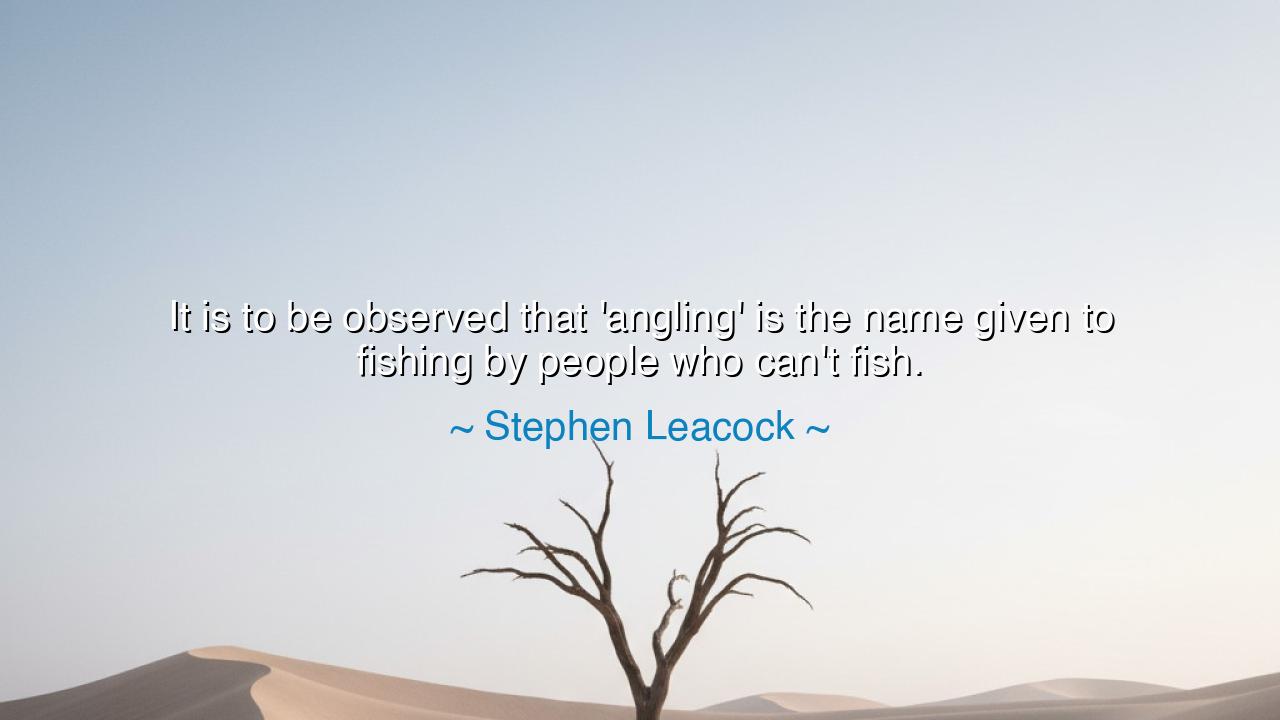
It is to be observed that 'angling' is the name given to fishing
It is to be observed that 'angling' is the name given to fishing by people who can't fish.






“It is to be observed that ‘angling’ is the name given to fishing by people who can’t fish.” — in this line, Stephen Leacock, master of satire and subtle truth, casts his humor like a well-weighted lure into the waters of human vanity. On the surface, it is a jest — light, playful, and almost trivial. Yet beneath that calm surface swims a deeper current of meaning. Leacock is not speaking merely of fishing; he is speaking of pretense, of the difference between doing a thing and naming it, between living and posing, between authentic skill and the illusion of mastery.
In ancient style, we might say that Leacock mocks not the fisherman, but the spirit of pride that dwells in those who cloak incompetence with clever words. To “angle,” in his sense, is not to fish with craft and patience — it is to disguise failure with sophistication. So it has been through all ages: men who cannot fight call themselves strategists, those who cannot write call themselves critics, and those who cannot love call themselves philosophers of love. Language becomes a veil, a shield against truth, and through this veil, we lose the simplicity of honest doing.
Leacock’s humor thus exposes a timeless human weakness — the tendency to replace experience with appearance. Where once men labored by the river’s edge with quiet dignity, now they stand beside it, speaking in polished terms about “technique” and “tackle.” The river does not care for their vocabulary; the fish do not rise to their eloquence. Nature responds only to sincerity, as life itself does. The deeper message here is that the world honors authenticity, not performance.
History, too, tells of such contrasts. Consider the story of Ernest Hemingway, who, though known for his prose, was a fisherman of fierce devotion. He did not write of the sea from afar — he faced it, fought it, and was humbled by it. His tale, The Old Man and the Sea, is not about victory but authentic struggle — the dignity of the one who dares, rather than the one who speaks. Hemingway could truly “fish,” and thus his words carried the weight of lived truth. Those who only “angle” at experience can never write, act, or live with such depth.
Leacock’s observation also reveals the danger of intellectual distance — of turning life into an abstraction. When one begins to name, categorize, and theorize instead of doing, the living spirit fades. The true craftsman knows that mastery is born not of titles or terminology, but of touch, trial, and time. Just as no man learns the river by reading about it, no soul learns courage, love, or faith without stepping into the current and being tested by it.
There is also compassion in Leacock’s jest. He laughs not to belittle, but to awaken — to remind us that life is not meant to be watched or described, but lived. Those who stand apart, dressing their inexperience in refined words, cheat only themselves. It is better to cast one’s line and fail a hundred times than to speak wisely of fishing and never once feel the pull of the river.
The lesson, then, is simple and profound: do not “angle” when you can act. Do not decorate inexperience with language; replace talk with trial, pride with practice. In every art, every craft, every calling, seek the truth of doing, not the safety of pretending. Be clumsy, be awkward, but be real. For skill is born of sincerity, and sincerity is the foundation of all wisdom.
So remember, my listener of later ages — when you next hear a man speak at length of what he has not done, smile as Leacock smiled. The world is full of anglers, but the river still waits for fishermen — those who come not to speak of it, but to meet it. Go, then, and cast your own line. Even if the catch eludes you, you will have lived more deeply than all the eloquent “anglers” on the shore.






AAdministratorAdministrator
Welcome, honored guests. Please leave a comment, we will respond soon